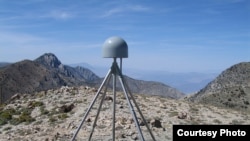The major drought gripping the western United States is not only drying the landscape, it’s causing the land to rise.
Researchers at Scripps Institution of Oceanography at the University of California at San Diego used GPS data to determine the drought has caused the land to rise, on average, 4 millimeters across the western states. The Sierra mountains of California rose over half an inch.
Duncan Agnew, a Scripps Oceanography geophysics professor and co-author of the paper said that “in areas of deep soil, the material behaves like a sponge. When the water dries out, it shrinks or goes down.”
“If you’re not on deep spoil the effect is that the earth is like a spring,” he said “The water is no longer pressing down on that area so it rises.”
That’s what’s happening in the western U.S., and the findings quantify the staggering water loss wrought by the drought.
Based on the findings, Agnew said he and his team believe the water loss due to the drought exceeds 240 trillion liters of water.
“It’s like covering the western half of the U.S. with a layer of water 10 centimeters thick,” he said.
If the drought lifts, expect the land to fall under the weight of the water. In fact, Agnew said, there was a downward shift in 2011, which saw a very wet winter.
Agnew said the rise would not effect California’s earthquake prone San Andreas Fault.
“It does change the stress on the fault, but by a very small amount,” he said. “It’s the same pressure you’d feel putting your hand in an inch of water.”
Last year was the driest on record in California, and this year may be just as dry.
Some reservoirs are empty and the Sierra mountain snowpack, which melts and fills rivers in the springtime, is at dangerously low levels - just one quarter of normal.
Farmers warn of another "Dust Bowl" - referring to the drought and dust storms that ravaged American farmlands in the 1930s.
The drought is so bad that California Governor Jerry Brown called it “epochal.”
Eighty percent of the state is experiencing “extreme” or “exceptional” drought, leading to strict measures restricting the use of water.
Agnew’s paper appears in the August 21 online edition of the journal Science.




